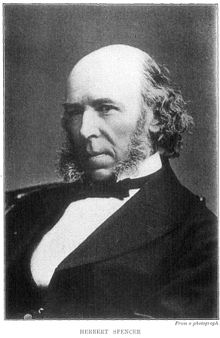Survival of the Fittest
Survival of the Fittest means in the sense of Darwin's theory of evolution the survival of the best adapted individuals. This expression was coined in 1864 by the British social philosopher Herbert Spencer . Charles Darwin took the term from the 5th English edition of his work The Origin of Species in 1869 in addition to his now the technical term term Natural Selection ( Natural Selection ).
origin
Herbert Spencer coined the phrase "Survival of the Fittest" in his Principles of Biology in 1864 and introduced it to the discussion about Darwin's book on the origin of species :
- "If [...] individuals of a species [...] necessarily have to diverge in innumerable directions and degrees, [...] then, among all individuals, some must always be less exposed than others to the danger that their equilibrium will be compromised by a special force [...] ] will be completely destroyed. [...] The necessary consequence will be that those individuals whose functions deviate most from the equilibrium with the modified aggregate of external forces must perish, while those, on the other hand, will survive whose functions most closely equilibrate with the modified aggregate of external forces Forces come close. "
- "This survival of the fittest (ger .: Survival of the Fittest ) but also the proliferation of the fittest result. [...] "
- "This survival of the fittest [...] is the same as what Mr. Darwin as natural selection (ger .: Natural Selection has referred) [...]."
The view sometimes held in the historical literature that Spencer coined the “Survival of the Fittest” as early as 1851 in his “Social Statics” or in 1852 in his “Theory of Population” is not correct in this form. With the concept but not the term, Spencer represented the "survival of the fittest" in a socio-political sense. It was not until 1864 that he introduced the term “Survival of the Fittest” as described above in the “Principles of Biology” in the discussion about Darwin's book on the origin of species.
Darwin
From this point on, Darwin overwrites the chapter on natural selection with Natural Selection; or The Survival of the Fittest . Darwin felt compelled to take this step because, immediately after its publication in 1859 , his work The Origin of Species was exposed to massive accusations that the term Natural Selection personified nature. The decisive argument for the expanded terminology was then provided by Darwin's colleague Alfred Russel Wallace , who wrote to Darwin that the term Natural Selection was actually a metaphorical expression for Herbert Spencer's Survival of the Fittest . Natural selection is therefore inappropriate, since in evolution there is not so much a selection of favored individuals as an elimination of disadvantageous individuals. Darwin agreed with this criticism and adopted the term.
Fit or fitness in Darwinian terms describes the degree of adaptation to the environment (i.e. adaptive specialization), or the ability to reproduce despite low specialization, and not the physical strength and assertiveness in the sense of a direct suppression of competition using violence. This means that it is not the species that survives that defies everything and displaces other species, but rather the one that either adapts to the environment or manages to reproduce continuously despite adverse environmental conditions.
At an early stage of the discussion , Darwin's colleague Thomas Henry Huxley pointed out the criticality, the ambiguity and the potential for abuse of Spencer's terminology - even in the English original language .
Evolutionary biologists avoid the term today because it does not adequately describe the current conception of evolution. On the one hand, it suggests a continuity in evolution towards ever greater fitness. Today's species would then be “fitter” than extinct, which is not the case. Second, he ignores the principle of sexual selection .
literature
- Wolfram Forneck: The inheritance of individually acquired traits. Depicted at the dispute between August Weismann and Herbert Spencer . 2nd Edition. Books on Demand, Norderstedt 2014, ISBN 978-3-7357-9153-5 , pp. 38 ff . , Chapter 4.5 "Survival of the Fittest"
Web links
Individual evidence
- ↑ from: Herbert Spencer 1862-1896: A System of Synthetic Philosophy. The Principles of Biology. Vol. I, § 164, 1864; quoted here from the German edition: Die Principien der Biologie. Volume 1, translated by B. Vetter from the 2nd English edition. Stuttgart 1876.
- ^ Herbert Spencer: Social Statics, or The Conditions essential to Happiness specified, and the First of them Developed.
- ^ Herbert Spencer: A theory of population, deduced from the general law of animal fertility. In: Westminster Review. 75, 1852, pp. 468-501.
- ↑ So JDY Peel: Herbert Spencer: The evolution of a sociologist. London 1971, p. 137; and JA Rogers: Darwinism and Socialdarwinism. In: Journal of the History of Ideas. 33, 1972, pp. 265-280.
- ^ See on the dictum of the "Survival of the Fittest": Wolfram Forneck: The inheritance of individually acquired traits. Depicted at the dispute between August Weismann and Herbert Spencer . 2nd Edition. Books on Demand, Norderstedt 2014, ISBN 978-3-7357-9153-5 , pp. 38 ff . , Chapter 4.5 "Survival of the Fittest"
- ↑ Thomas Henry Huxley : "The unlucky substitution of" survival of the fittest "for" natural selection "had done much harm in consequence of the ambiguity of" fittest "- which many take to mean" best "or" highest "- whereas" natural selection “may work toward degradation […]“ In: Leonhard Huxley (Ed.): Life and letters of Thomas Huxley. 2 Vols, Volume 2, New York 1901, p. 284.
